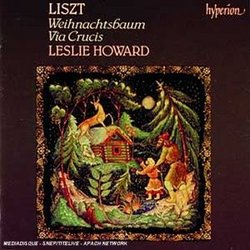| All Artists: Franz Liszt, Leslie Howard Title: Liszt: Weihnachtsbaum; Via Crucis Members Wishing: 0 Total Copies: 0 Label: Hyperion UK Release Date: 11/16/1993 Album Type: Import Genre: Classical Styles: Forms & Genres, Short Forms, Suites, Instruments, Keyboard Number of Discs: 1 SwapaCD Credits: 1 UPC: 034571163888 |
Search - Franz Liszt, Leslie Howard :: Liszt: Weihnachtsbaum; Via Crucis
CD DetailsSimilar CDs
|
CD ReviewsLiszt the Devout Hexameron | 06/26/2007 (5 out of 5 stars) "Volume 8 in Hyperion's Complete Piano Music of Liszt is somewhat of an anomaly. The presence of Liszt's Christmas Tree suite, a restrained collection of pieces composed for his granddaughter, and Liszt's own solo piano versions of his Chorales is not so strange. It's the inclusion of the awe-inspiring experimental choral work, the Via Crucis, which makes this recording a bipolar one. The contrast in both substance and mood between the Christmas Tree and Via Crucis should come as a shock when listening. As haunting and authentically religious as the choral version of Via Crucis is, this dark and dissonant work becomes doubly visceral in the piano's timbre. But first the happy stuff. Liszt's Christmas Tree suite is an amiable and tantalizing collection of pieces. About half of these are based on famous Christmas carols. Liszt's treatment of these famous melodies is tasteful and a pure joy to hear. It wouldn't hurt radio stations or concerts to plays these pieces during the Christmas season once in a while; they are accessible, brilliant and totally evocative of the Holidays. Not all of these are mere paraphrases or works based on Christmas tunes, however. Liszt has also written his own original compositions and all of them are engaging. The Little Scherzo for "Lighting the Tree" and the Carillon or "Chimes" are whimsical and sweet. "Evening Bells" and especially "Old Times," apparently "a nostalgic remembrance of the first meeting between Liszt and Princess [Carolyne] Wittgenstein," are marvelous pieces of Romantic tenderness and melancholy. The most surprising gem of this suite is the unreserved "Polish" piece, marked by rapid dance rhythms and virtuosic surges of chromatic octaves; Liszt's granddaughter, Daniela, (Hans von Bulow's daughter) must have been a daredevil at the piano if she could play this! Although the Weihnachtslied and Chorales make their appearance here as piano versions, they are not interesting enough to garner any important commentary, especially when a Liszt masterpiece, Via Crucis, has yet to be discussed. Liszt's Via Crucis is one of his most avant-garde and utterly incredible music experiments. Liszt's decision to write music to the Crucifixion of Jesus is daring enough. But his choice of mood and effect, completely morose and raw, is so explicit that the music sounds like nothing from the 19th century. Not surprisingly, Via Crucis "was rejected by a prominent firm of publishers of religious music... and was not in fact performed or published till more than forty years after [Liszt's] death." Typical of his late period, Liszt's exploration of darkness, dissonances, and pictorial effects presage all of impressionism and 20th century music. From the violent and jarring first Station, "Jesus is condemned to death" to the bleak and terrible sounding Second Station "Jesus is made to carry his cross," Liszt creates a terrifying atmosphere of agony and grief. Additionally, I have yet to hear a better illustration of horrible pain and sorrow than found in all three Stations about Jesus falling while carrying the cross. According to Howard, "The eighth Station, The women of Jerusalem, is one of the most idiomatic musical descriptions of weeping in the whole literature." The three Stations depicting Jesus' deprivation of clothing, the nailing to the Cross, and his death are harrowing, brutal, but absolutely beautiful. Those new to this music will find some of the most unnerving and profound musical ideas from Liszt's pen. And those familiar with this work can expect the piano version to exhibit as much expressive power as the choral version. Humphrey Searle makes the following assertion about Via Crucis, that while the nature of the work is avant-garde, "the result is not a mere experiment, but a very deeply felt and moving work." I couldn't agree more. Bottom line: Although this Volume contains the lovely Christmas Tree suite, it is with the world-premiere recording of the piano version of Via Crucis in mind that I give this Hyperion release 5 stars. This piano version of Via Crucis is easily on par with R.W. Venezia, Unstern Sinistre Disastro, and the La Lugubre Gondolas, Liszt's blackest works." Christmas joy Virginia Handy | Sodus, MI | 01/17/2010 (5 out of 5 stars) "So glad I heard this on WAUS radio from Berrien Springs, MI early one December Sunday morning, before 8 a.m.
Imagine - new Christmas music! It was a joy to listen to it the first time. This pianist I found out has recorded 94 CDs, the complete piano music of Franz Liszt. He is Australian, Leslie Howard by name (apparently not related to the English actor by same name.) He is the outstanding Liszt interpreter in the world. We hear so few pieces by Liszt in the repertoire of most pianists. Would love to have all 94 CDs. I could only locate it by searching for "Hyperion CD 66388" on Amazon.com." |



